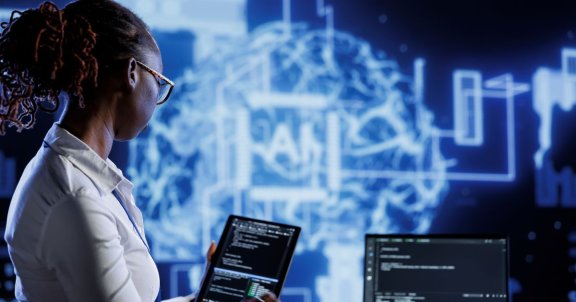AI and Cybersecurity: Navigating Risks and Opportunities

Artificial intelligence (AI) is playing an increasingly crucial role in enhancing cybersecurity. As cyberattacks grow more sophisticated, leveraging AI can provide the real-time defenses needed to stay ahead. However, AI and cybersecurity also bring their own set of challenges. Understanding both the opportunities and the risks is key to developing effective security strategies that use AI to its full potential.
How AI is Transforming Cybersecurity
The use of AI in cybersecurity has revolutionized how we detect and respond to threats. AI-driven tools use machine learning to identify patterns, anticipate threats, and take immediate action, often without human intervention. These systems can analyze massive amounts of data from network traffic, user behavior, and system logs to pinpoint unusual activity that might indicate a security breach.
One of the most significant advantages of AI is its ability to detect zero-day attacks. A zero-day attack occurs when hackers exploit a software vulnerability that the developer hasn’t yet discovered or patched. These attacks are particularly dangerous because they can bypass traditional security measures. However, AI’s ability to continuously learn from new data helps detect suspicious patterns, even in these unknown attacks, before they cause serious damage.
Challenges of AI in Cybersecurity
While AI enhances security capabilities, it also introduces new challenges. One of the primary concerns is that attackers are also using AI to improve the sophistication of their attacks. For example, AI cybersecurity tools can be used to automate attacks, making them faster and harder to defend against. Hackers are increasingly leveraging AI to develop more effective phishing scams and malware.
Another major concern is the risk of internal attacks, where cybercriminals manipulate AI models by feeding them malicious or misleading data. This can result in AI systems failing to detect or respond to real threats. Additionally, privacy issues arise when AI systems rely on large datasets, which may include sensitive personal or organizational information. Mismanagement of this data can lead to compliance issues, particularly with privacy regulations.
Key Trends on AI Security
Several trends on AI security are shaping the future of the industry. One notable trend is the rise of AI-powered threat intelligence, which allows cybersecurity professionals to gain deeper insights into evolving threats. AI analyzes data from a wide variety of sources, including public reports and private databases, providing a comprehensive view of the current threat landscape.
Another key trend is AI's integration with the Zero Trust framework. This security model assumes that no one inside or outside the network is trustworthy by default, requiring continuous validation. AI enhances this by using machine learning to monitor behavior, detect anomalies, and adjust security measures dynamically based on perceived risks.
Additionally, AI plays an essential role in protecting cloud services and Internet of Things (IoT) devices. The Internet of Things (IoT) refers to the network of physical devices—such as smart home appliances, wearables, or industrial machines—that connect to the Internet and communicate with each other. As more organizations use these devices, the number of entry points for hackers increases. AI helps monitor the massive amounts of data produced by IoT devices, identifying and addressing vulnerabilities that might otherwise go unnoticed by human analysts. By securing both cloud environments and IoT devices, AI is helping prevent new types of attacks that arise from this expansion of connected devices.
The Future of Artificial Intelligence and Cybersecurity
The future of artificial intelligence and cybersecurity will likely see increased automation in threat detection and response, making systems more resilient and adaptive. AI will continue to take on repetitive and routine tasks, allowing security professionals to focus on higher-level strategy and decision-making. However, to fully benefit from these advancements, human oversight is vital, ensuring that AI is used ethically and effectively.
As the capabilities of AI grow, so too will the need for more robust cybersecurity measures to defend against AI-powered attacks. This creates a landscape where both cyber defenders and criminals are racing to outpace each other with ever more advanced technologies.
Buckeye Broadband's AI-Powered Cybersecurity Solutions
Buckeye Broadband offers a variety of cybersecurity resources to help protect your business or home network from evolving threats. These include tools and guidance on phishing detection, password security, and network vulnerability management.
Whether you're a small business looking to enhance your cybersecurity or a homeowner seeking to secure your network, Buckeye Broadband provides essential resources and advice to help you stay protected.
